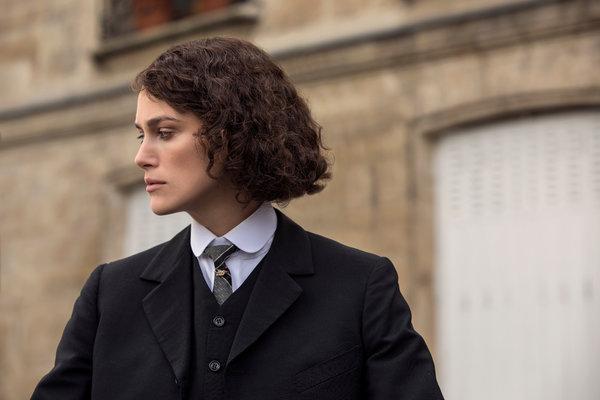Colette
Directed by Wash Westmoreland
Starring Keira Knightley, Dominic West, Denise Gough, Eleanor Tomlinson
Reviewed by Michael Dalton
[rating: 4/5]
2018 has been a year, and a curious time for such films, where women have appeared in roles that involve various forms of subjugation. Glenn Close’s work in The Wife involved her standing dutifully by her successful husband while he took so many bows for her hard work while Elle Fanning, in the curiously blank Mary Shelley. allowed her work to be seen under another’s man name. This week, another film has opened where, due to societal constraints, a talented young lady is forced to see her work credited to her husband. That woman is Sidonie-Gabrielle Colette, the film, directed by Wash Westmoreland, is Colette, its set at the beginning of the 20thcentury, and it stars the luminous Keira Knightley in her finest performance. Born in 1873, Colette married three times, enjoyed countless affairs (including one with her teenage stepson), and established a literary legacy unmatched by any other female author in France’s history, before passing away in 1954.
The story as seen here, and its only a snapshot of a much larger picture, tells of her marriage to Henry Gauthier-Villars, known as Willy (gutsy work by Dominic West), who allowed minions to ghost write his ideas into pulp novels. Early in the action, he suggests Colette write for him too but he dismisses her style as “too cloying, too feminine” but later when they fall on hard times (their furniture is repossessed), he opens one of her manuscripts and reconsiders its potential. Published with his name on it, it was the beginning of a series of novels about a heroine called Claudine and they’re a phenomenal success; following the warm reception of the first novel, Willy is so determined she continue that he keeps her under lock and key until she delivers a second. In private Colette was bisexual, in one instance even sharing a lover (Eleanor Tomlinson) with her husband (in these scenes Thomas Ades’s sumptuous score very nearly turns this interlude into a bedroom farce). But then another came along, Mathilde “Missy” de Morny (Denise Gough), an aristocratic secure in her sexuality (she marches about in trousers and shirts), who inspired Colette to realise herself completely, both as a woman and as a performance artist. In one memorable sequence, Colette emerges on stage from a sarcophagus while Missy dashes about dressed up as an explorer and the two start a riot in the theatre when they share a kiss.
Visually Colette has the same softness as Still Alice, the previous feature directed by Westmoreland with his late partner Richard Glatzer, but, where that moving film felt plain and often maudlin (it told the story of a woman with Alzheimer’s Disease), as Colette continues, it flower and stretches. The film has rhythm, and it’s sensual. The sexual element marries with the literary. Purists may grapple with the fact that this is French history and characters (curiously when we glimpse Colette’s text it is in French) but who better, when done in English, than the English (oh those clipped accents) to bring it alive? The exquisitely beautiful Knightley is a sensation here. Scene by scene, we watch her face and body come alive as she drinks in the abandon and potential of wild Parisian life. Early in the action, Colette and Willy attend a party and she remarks, “The wild days have just begun”. Indeed they had. Blazing one’s own path is never tame.




